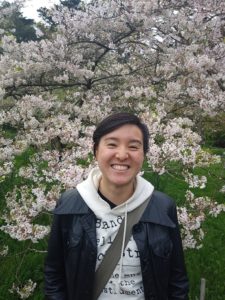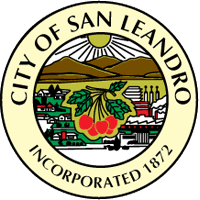Q & A With the New City of San Leandro Sustainability Manager
In September, the City hired Hoi-Fei Mok, PhD as the City’s new Sustainability Manager. Fei comes to the City with a strong background in climate equity and local community/government engagement related specifically to sustainability and resiliency. Having most recently worked for ICLEI Local Governments for Sustainability at the USA regional office, Fei’s expertise is grounded in technical support and data analysis around climate change mitigation, greenhouse gas inventorying, adaptation, and climate action planning.
Fei holds a PhD from the University of Melbourne, Australia with a dissertation on the feasibility of wastewater reuse for agricultural irrigation and a BA in Biochemistry with Honors from Wellesley College, MA. In addition to their work with ICLEI, Fei has worked with the City of Emeryville on developing their climate action plan 2.0, updating their greenhouse gas inventory, and implementing a diversity of climate and sustainability initiatives as their CivicSpark AmeriCorps 2015-2016 fellow. Fei is an active community organizer both with various social justice and climate justice organizations around the Bay Area and nationally.
We sat down with Fei to learn about their plans in this new role.
SLNext: What are your top sustainability goals for the City of San Leandro?
Mok: I have a lot of ideas, but I want my goals for sustainability in San Leandro to be driven by the people. My main project at the moment is updating the City’s Climate Action Plan, which will guide our programming and projects around climate change. Climate impacts like wildfire smoke often hit people of color and low income communities first and worst, and these same communities are usually the least prepared with resources to bounce back. Climate justice requires us to prioritize addressing root causes of this – racism, poverty, interconnected systems of oppression – and preventing future unintended consequences of policy. Therefore, I’d like this plan to be equitable and people-centered, and really ensure that whatever projects we come up with meet people’s needs moving forward. This can look like better outreach on cost-saving energy efficiency programs for renters, planting more trees for better air quality by the freeways, or creating cooling centers where buildings don’t have air conditioning for extreme heat days.
There is also the issue of civic engagement. The more that people can participate in the decision making process by giving their input, the more we can make sure they are prioritized in the resources and programs. Part of my work then is making sure that we make engagement as accessible as possible with translation, childcare, food, and central meeting locations, or even going to where people are already meeting.
My larger vision is that we can work together towards an equitable climate resilient future where people have access to local green jobs, clean air and water, renewable energy, affordable transit, and safe housing for all.
SLNext: What do you see as the most unique opportunities in San Leandro? What excites you about working here?
Mok: It’s exciting having grown up here and now getting the chance to better the community! San Leandro is a family oriented community with lots of active involvement in the schools and small family-owned businesses that have been established for generations. In a time when displacement and gentrification is at a high in the Bay Area, San Leandro has still maintained its small town character, which is a great strength. Bringing people together and finding local solutions to climate and sustainability challenges is something that I think is definitely achievable and exciting to work towards. I’ve been spending the last few weeks getting to know different community organizations and partners active in San Leandro and learning about what’s important to them – there’s a real opportunity to figure out where people’s interests and needs align with our climate program. The good (and bad) thing about climate is that it does affect everyone to a certain extent so everyone can benefit from finding those local solutions. For example, there is a real opportunity for more green businesses and well-paying green jobs.
SLNext: Tell us a little about your background and work experience: what are some sustainable projects you have completed prior to coming to the City of San Leandro?
Mok: My education is in environmental science and I did research in Costa Rica, Tibet, and Australia in sustainable agriculture, ecology, and climate change before transitioning to policy work. I’ve worked with local governments in the last 4 years in climate policy, helping people understand the technical data and develop plans around climate action and adaptation. Some of the projects I’ve worked on include developing the City of Emeryville Climate Action Plan 2.0, coordinating a cost-saving building energy efficiency audit program for small businesses and starting a community garden at the Emeryville Center for Community Living. In addition to the policy work, I am also a community organizer in the Bay Area and actively work on anti-racism, immigration justice, and climate justice, among others.
SLNext: How do you see the City changing in the next 10 years thanks to sustainability efforts?
Mok: My hope is that we become more and more resilient in the face of more frequent climate events like wildfires and power shutdowns. This could look like stronger community networks that can help connect people to each other so we can support each other and making sure we have community resilience hubs where people can go to for resources and supplies during emergencies. I want to be more rooted in indigenous traditions and values, and be able to create a community that will last for seven generations forward. I would also love to see more community gardens, neighborhood trees, public transit connected affordable housing, more bike lanes, solar battery storage, micro-grids, and programs that help people cut costs and skill up in new green careers.
SLNext: What do you see as the biggest challenge as we look to the future?
Mok: The speed and unpredictability of extreme storms and fires will be a challenge. These events can be really devastating to people and businesses, causing physical harm or economic losses. Our infrastructure, from our electrical grid to water supply, is not designed for a world of unstable climate and maintaining services will be hard when we are accustomed to having all our resources on hand at all times. It is going to be a challenge to create programs and projects that are staying ahead of these changes – I fear that we will be stuck in playing catch-up on these climate emergencies.








Leave a Reply